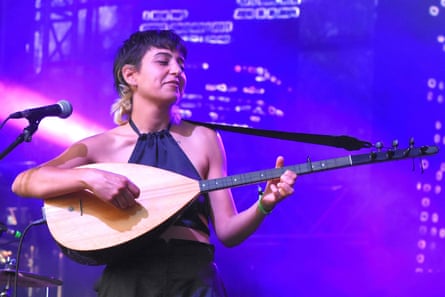The first time singer Derya Yıldırım met keyboarder Axel Oliveres and bassist Antonin Le Gargasson, she was sceptical: “I wasn’t sure if these guys were maybe just taking the piss.” They were two French hipsters living in east London; she was the classically trained daughter of Turkish parents living in the migrant-rich Hamburg district of Veddel. All three were a long way from Anatolia, the traditional folk music of which they’d been commissioned to reinterpret for a 2014 Hamburg arts festival.
Yıldırım didn’t speak English or French, and Oliveres and Le Gargasson didn’t speak German or Turkish. “I thought, who are these guys?”, she recalls. “If you grow up in Veddel, you are already used to being stigmatised, and then someone comes to your neighbourhood and tells you they want to make art.” But almost 10 years later the “outernational” band they formed is still going, even though they’ve still never lived in the same city at the same time. “When we started to concentrate on our instruments, we found a common language”, Yıldırım recalls. “It was like a perfect match on a date.”
While Yıldırım and South African drummer Helen Wells are based in Berlin and the two French musicians are now ensconced in the French Alps, the band – billed as Derya Yıldırım & Grup Şimşek – have nonetheless managed to build up a passionate and loyal fanbase across Europe that extends beyond the Turkish diaspora. If recent gigs in Hamburg and Berlin are anything to go by, their concert at London’s EartH Hackney this Sunday is more likely to draw a mixed young international crowd than the members of Kingsland Road’s local Kurdish community.
“We don’t seem to have a target audience”, Yıldırım says, who sings traditional songs she learned from her parents, who migrated from eastern Turkey via the West German “guest worker” programme in the middle of the last century, as well as some of her own compositions. “When we play, I am often struck by the fact that there aren’t that many people in the crowd who speak Turkish or Kurdish.”
In her German homeland, the contemporary music scene has until now proven more resistant to incorporating the music from migrant communities than elsewhere in Europe. The UK had Cornershop and Asian Dub Foundation, France has had Rachid Taha’s rock’n’raï and MC Solaar’s griot-rap, Belgium the rumba-tinged Europop of Stromae – in Germany, by contrast, the orientally flavoured “R’n’Besk” of Cologne’s Muhabbet or Les Robespierre’s Portuguese-language take on Hamburger Schule indie have remained niche phenomena.
“Germany is light years behind England or France when it comes to bands that take the music of their migrant parents and turn it into something chart-compatible”, says Imran Ayata, a writer and campaigner who in 2013 made a hit compilation of forgotten musical gems from the first generation of migrant workers, called Songs of Gastarbeiter.
Some of these songs, such as Ozan Ata Canani’s Deutsche Freunde – which Grup Şimşek have covered at live shows – are now sometimes heard in the trendier bars and clubs of Berlin, Hamburg or Munich. But they’ve never crossed over into the mainstream. “Maybe we simply lack that casualness, that coolness,” Ayata says. “But Derya is something different.”
The Turkish words Şimşek and Yıldırım can both be translated as “lightning”, and if you watch Yıldırım and her band play live, you quickly understand why they doubled down on the suggestion of instant electrification.
Oliveres, Le Gargasson and Wells serve up a soulful blend of retro-flavoured, jazzy psychedelia heavy on Hammond organs and wah-wah effects. But when Yıldırım launches into her bağlama, a seven-stringed, long-necked lute, she releases flashes of jagged energy into the auditorium. Sometimes, on a break in the groove, Yıldırım leaves her hand hanging above her head after plucking one of the instrument’s seven metal strings, as if to offer herself as a lightning conductor.
Don’t call it windmilling, though: liken the bağlama to a guitar and the 30-year-old bristles. “I know the guitar has managed to create its own universal genres, like rock, while bağlama has never left its regional association behind,” Yıldırım says. “But to be honest I don’t understand why that is, because the feelings that it can convey are universal.”
Originally mainly used to accompany Alevi poets during recitals, the bağlama made its first foray into western music, when artists such as Barış Manço and Erkin Koray blended Anatolian folk and psychedelic rock for a worldlier new generation who had grown up in the Turkish republic. The pioneers of the genre are audible references for contemporary bands such as Amsterdam-based Altın Gün, and Grup Şimşek’s 2019 debut album Kar Yağar.
In hindsight, Oliveres says, the homage may have been a bit too obvious: “We were trying to imitate too much, we were too predictable.” Their album Dost 2, which was released in August last year, steps out of the psychedelic thicket of its predecessor and is lighter footed, leaning into stripped-back soul before lurching into disco with howling, William Onyeabor-style keyboards. In February this year, Yıldırım and Oliveres released Hey Dostum, Çak!, an eclectic collection of children’s songs, lullabies and vintage electronica that is more likely have your kids bouncing off the walls than send them to slumberland.
Given the geographical distance between the different band members, and rehearsals limited to four-day sessions every couple of months, they may take their time to bring this music to a bigger stage. “I sometimes think it’s almost a blessing in disguise that we don’t live in the same cities and practise every Thursday”, says Oliveres. “It allows us to evolve, even if a bit slowly.”
And despite the band’s broad roots, Yıldırım is firm about where she’s now planted. “I know people think we play retro music, but for me what we do is more like soul meets folk,” says Yıldırım. “I am not from Turkey and don’t want to do the same thing they did in the 60s and 70s. I am from Germany.”

